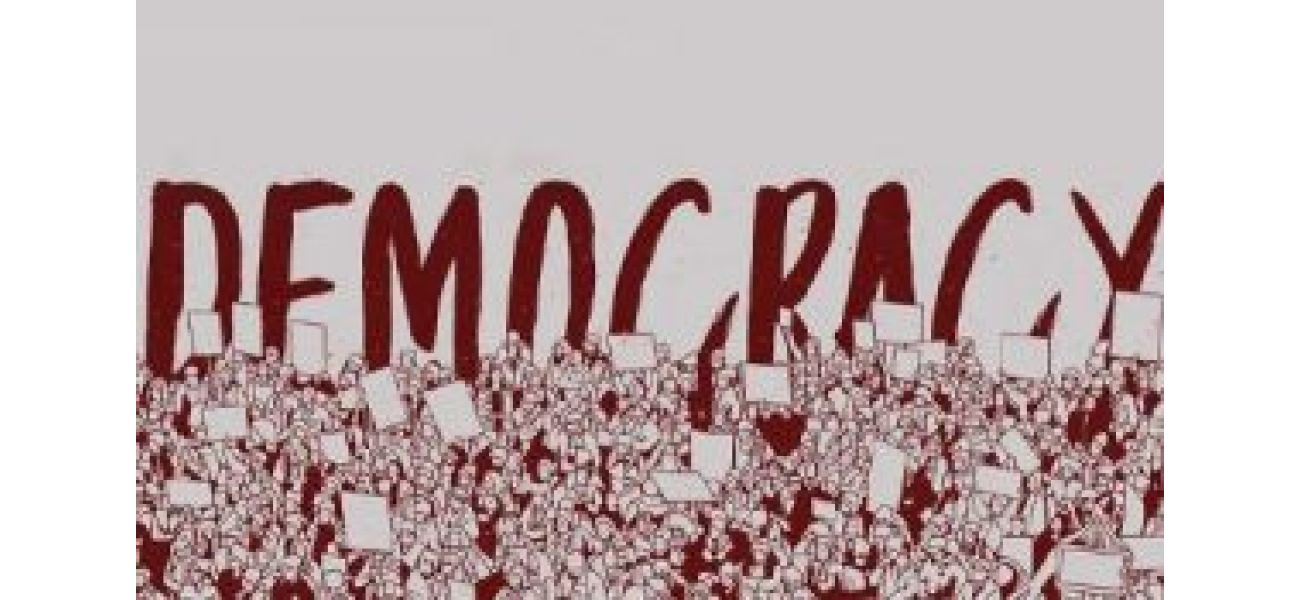Undermining the principles of democracy.
Democracy being distorted globally, failing citizens. Ruling class in Asia and Europe not living up to expectations.
September 16th 2025.

It's a clear indication of the current state of affairs that democracy is being distorted in various countries, transcending geographical borders. What was meant to be the best form of government for the common people is now giving them a raw deal. The ruling class in many Asian and European nations has failed to improve the lives of their citizens, instead prioritizing the interests of the wealthy elite and lining their own pockets. This has caused immense frustration and neglect among the people, leading them to take to the streets in protest and even resort to violence to remove corrupt politicians from power. Those in positions of power who claim to uphold democracy but use it for their own gain have been taking the people for granted for far too long, relying on their votes to maintain their hold on power. But now, they are facing the consequences of their actions, with some even risking their lives for their negligence.
Recent events in countries like Nepal, Bangladesh, and Sri Lanka have shown how violence has been used as a means to bring about change in government. In France, the people have sent a strong message to their government through fierce and violent street protests, demanding immediate action to save their democracy. As a result, a new Prime Minister, Sebastien Lecornu, has been appointed to replace the unpopular Francois Bayrou. He is the fifth PM since President Emmanuel Macron's second term began and the third since the dissolution of the Assemblée Nationale in 2024. In his first speech as PM, Lecornu highlighted the rapid loss of trust in the democratic system in France.
Experts are skeptical about the success of the new PM in restoring the people's faith in democracy due to the chaos created by existing political parties. The constant shifting of political alliances to form a government has only created more problems instead of solving them. The fragile alliance between Macron's Centrists and the traditional right is on the verge of collapse, and Lecornu's appointment does not inspire much confidence among the Socialists, whose support is crucial for passing the budget. The new PM, at the age of 39, comes from the old Center-Right party, UMP, and his main qualification for the role seems to be his close relationship with Macron. However, even the Left is skeptical of him due to his previous association with Far-Right leader Marine Le Pen. The Socialist leader Olivier Faure has fired shots at Lecornu, and it seems that negotiations will be tough, with parties vying for their own benefit rather than the people's.
On the other hand, radical Left leader Jean-Luc Melenchon is trying to capitalize on the political chaos by calling for fresh legislative elections. He believes his party can overthrow the Far-Right Rassemblement National, which is currently leading in opinion polls. The situation in France is precarious, and Lecornu, in his first speech as PM, adopted a humble approach, underlining the freedom given to him by the President to have open discussions with any political forces and social partners willing to work with him. However, he will need to do more to regain the people's trust, starting with abandoning the previous PM's policies, which were deeply unpopular. The people need to see real change, not just empty promises.
The new PM will have to convince the people that he will not continue with the draft budget proposed by his predecessor, which has been widely rejected. While the Right remains firm on tax issues, the Socialists have made it clear that they will not support the government unless they see real concessions made for taxing the wealthiest households. This is similar to the situation in Asian countries, where people took to the streets to protest against the ban on social media platforms, and in France, where the proposed elimination of two public holidays sparked anger among the working class, who would have to work more for less pay. These may seem like minor reasons, but they are fueled by deeper frustrations. Democratic countries across the globe, including France, UK, Germany, Japan, India, and many others, need to listen to their people and address their day-to-day needs. Neglecting their citizens could lead to complete chaos and even the disintegration of the country.
Recent events in countries like Nepal, Bangladesh, and Sri Lanka have shown how violence has been used as a means to bring about change in government. In France, the people have sent a strong message to their government through fierce and violent street protests, demanding immediate action to save their democracy. As a result, a new Prime Minister, Sebastien Lecornu, has been appointed to replace the unpopular Francois Bayrou. He is the fifth PM since President Emmanuel Macron's second term began and the third since the dissolution of the Assemblée Nationale in 2024. In his first speech as PM, Lecornu highlighted the rapid loss of trust in the democratic system in France.
Experts are skeptical about the success of the new PM in restoring the people's faith in democracy due to the chaos created by existing political parties. The constant shifting of political alliances to form a government has only created more problems instead of solving them. The fragile alliance between Macron's Centrists and the traditional right is on the verge of collapse, and Lecornu's appointment does not inspire much confidence among the Socialists, whose support is crucial for passing the budget. The new PM, at the age of 39, comes from the old Center-Right party, UMP, and his main qualification for the role seems to be his close relationship with Macron. However, even the Left is skeptical of him due to his previous association with Far-Right leader Marine Le Pen. The Socialist leader Olivier Faure has fired shots at Lecornu, and it seems that negotiations will be tough, with parties vying for their own benefit rather than the people's.
On the other hand, radical Left leader Jean-Luc Melenchon is trying to capitalize on the political chaos by calling for fresh legislative elections. He believes his party can overthrow the Far-Right Rassemblement National, which is currently leading in opinion polls. The situation in France is precarious, and Lecornu, in his first speech as PM, adopted a humble approach, underlining the freedom given to him by the President to have open discussions with any political forces and social partners willing to work with him. However, he will need to do more to regain the people's trust, starting with abandoning the previous PM's policies, which were deeply unpopular. The people need to see real change, not just empty promises.
The new PM will have to convince the people that he will not continue with the draft budget proposed by his predecessor, which has been widely rejected. While the Right remains firm on tax issues, the Socialists have made it clear that they will not support the government unless they see real concessions made for taxing the wealthiest households. This is similar to the situation in Asian countries, where people took to the streets to protest against the ban on social media platforms, and in France, where the proposed elimination of two public holidays sparked anger among the working class, who would have to work more for less pay. These may seem like minor reasons, but they are fueled by deeper frustrations. Democratic countries across the globe, including France, UK, Germany, Japan, India, and many others, need to listen to their people and address their day-to-day needs. Neglecting their citizens could lead to complete chaos and even the disintegration of the country.
[This article has been trending online recently and has been generated with AI. Your feed is customized.]
[Generative AI is experimental.]
0
0
Submit Comment





